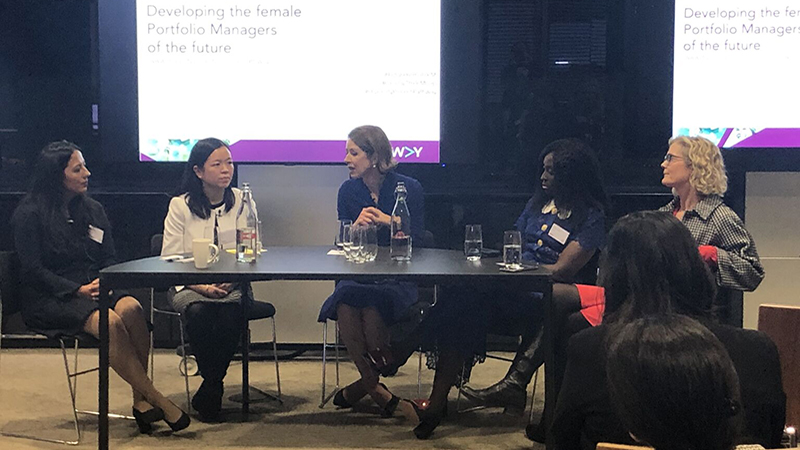By Holly Downes and Hannah Williford
The Diversity Project Pathway programme, which aims to increase the number of women in fund management roles, has reported that 16 participants from last year’s cohort were promoted to deputy portfolio managers or portfolio manager positions.
As a result, the Diversity Project is expanding the programme for 2024 from 60 to 80 participants across 43 investment firms – up from 30.
Diversity Project chair, Baroness Helena Morrissey (pictured), said at a recent event launching the second phase that the figures detail the impact the programme is making: “We have enough scale in this programme to move the needle. We aim to double the proportion of female fund managers within the next five years. It is not beyond the capability of any of us.”
As 88% of money management roles are occupied by men, the programme aims to give women more representation in the largely male-dominated industry.
Last year, 16 of the 60 participants were promoted after following Pathway, which teaches modules on technical skills, leadership, behaviour and brand, how to be a good investor, career activism, paying it forward and networking and role models, delivered via networking breakfasts, in-person sessions and bootcamps.
Success stories
As part of the programme launch for the second year, four women portfolio managers shared their stories on how they have navigated their careers so far.
Lan Wu, European credit portfolio manager at Legal and General Investment Management, is a mother of a one and three-year-old.
After gaining a maths degree, in 2008 Wu was accepted onto an internship at an investment bank, but timing was unfortunate as the global financial crisis shortly followed.
Instead of being held back, Wu saw this as an opportunity to explore other areas of the industry and she learned LGIM were looking to expand their European team with a fund manager assistant – Wu said she jumped at the opportunity and within four years, Wu was promoted to portfolio manager. Another four years later, she was the lead manager of a new fund launch. For Wu, becoming a mother has taught her about how to manage her demanding role.
“Something that is constant is the unpredictability of financial markets – just like children! I have learned to adapt to change and be flexible in your approach,” Wu said.
“Also, it is important to strike the balance of between work and life. And that doesn’t mean to do everything yourself, do not be afraid to ask for help when you need it.”
Amrita Sanyal, senior fund manager at HSBC Asset Management, said she wanted to be “a portfolio manager ever since I was a little girl”.
Originally from India, Sanyal gained a degree in maths and economics, and earned an MBA specialisation in finance. Sanyal was soon offered a job at the only asset management firm in India at the time. Despite the tragedy of her sister’s death 10 days before the interview, she pressed ahead, got the job and worked as an analyst for six years.
Sanyal then moved to the UK with her husband and started to navigate a new job with HSBC, studying for the CFA qualification and adapting to motherhood with her one-year-old.
“I learned very quickly that you can’t do everything by yourself. Networking is not just professional networking, it is also personal networking. Lean on people, ask them for help,” Sanyal said.
“If you want to leave at 5:30pm to pick up your child from nursery, it’s absolutely fine. You don’t tend to discuss that with your male colleague because he’s probably not doing that, but other female colleagues understand and will reassure you it is OK.”
Sanyal shared an anecdote of when she realised she was being too harsh on herself.
“I had just come back from maternity leave after six months. My child was in the nursery constantly falling sick, I was falling sick, and I came to work and said to my line manager that I want to go on leave… now. I was on the verge of breakdown because I just felt overwhelmed.
“She helped pack my bag and said: ‘You go on two weeks’ leave and we’ll talk about some flexibility to help you’. This was in 2008 where there was no talk of any flexibility. You couldn’t work from home. So again, people will only understand you if you tell them what the issue is. I shouldn’t have waited until I was about to have a breakdown to voice my concerns,” Sanyal said.
She added: “I wish I had a programme like this back in the day where I could talk to other women fund managers and find my tribe.”
Omotunde Lawal, head of emerging markets corporate debt at Barings, moved to the UK when she was 16 years old from Nigeria.
After beginning her career as an accountant at Arthur Anderson, she took on a rotational role at Barclays Capital and was introduced to its CFA program, which launched her career into the buy side in European high yield credit at Standard Bank Group.
However, after a few years the global financial crisis hit and Lawal was made redundant.
“At that point, you would think just go back to what you do, go back to accounting, go back to product control and performance analyst, which is what I did before,” Lawal said. “But it was about being open to the opportunities that come along and being quite clear that if this is what you actually feel is your path, then pursuing it, not taking no for an answer.”
Lawal was able to find her footing again, taking on a role on the emerging market prop trading desk in a post-2008 financial markets landscape. Years later, when her entire team was made redundant, they decided to set up a hedge fund in Mayfair.
Lawal had her second child at the time, but only took three months off because she said she felt pressure to return to her role if she was going to be successful. To make the transition work, Lawal spent her lunchtimes in the toilet expressing milk. As the only woman on the team, there were no other facilities for her.
Although the hedge fund eventually went under, Lawal found another position at Barings in 2016, the firm she still works for, and quickly became aware of the importance of role models.
“The person who actually hired me was a female fund manager, and that was the first woman boss I ever had,” Lawal said. “I think that also made quite a big difference in making me realise that I am where I’m supposed to be. And this is what I want to do. If she does it, I can do it as well.”
She added: “If you don’t see her, you can’t be her. For me, that was very key.”
Jean Roche, UK small- and mid-cap portfolio manager at Schroders, spent her childhood playing with her plastic roulette wheel and betting on horses.
Roche also studied maths at university, and earned a masters degree in financial and industrial mathematics before beginning her career as an equity analyst at Morgan Stanley. She then took on a role in HM Treasury, gaining experience in the public sector before heading back to private.
“I think my best mentors have been the people that I worked with at Morgan Stanley, 25 years ago,” Roche said.
“There were about 10 other graduates I’m still in touch with who have gone on to do other things. And they really understand because we all started in the same place. So you don’t have to explain things to them, because they know about the industry.”
Roche took on stints at Panmure Gordon as a director of equity research and Canaccord Genuity Wealth Management as a fund manager and analyst before moving to Schroders to work as a fund manager in 2015.
“Stocks don’t know whether you’re a man or a woman buying them,” Roche said. “This career is very measurable…your record does speak for itself, good or bad.”
Roche has raised two children during her career and said a turning point for her was having her mother and mother-in-law come to her explaining: “You’ve got to get some people in, because you can’t do it all yourself.”
Roche said she still sees many areas where the industry needs to grow, and noted a marketing trip she took in November to the Channel Islands: “There was no other female finance professionals there,” Roche said. “So I think there’s still a long way to go. So I’m delighted that (the Pathway programme is) is pushing this along because it needs to happen.”










